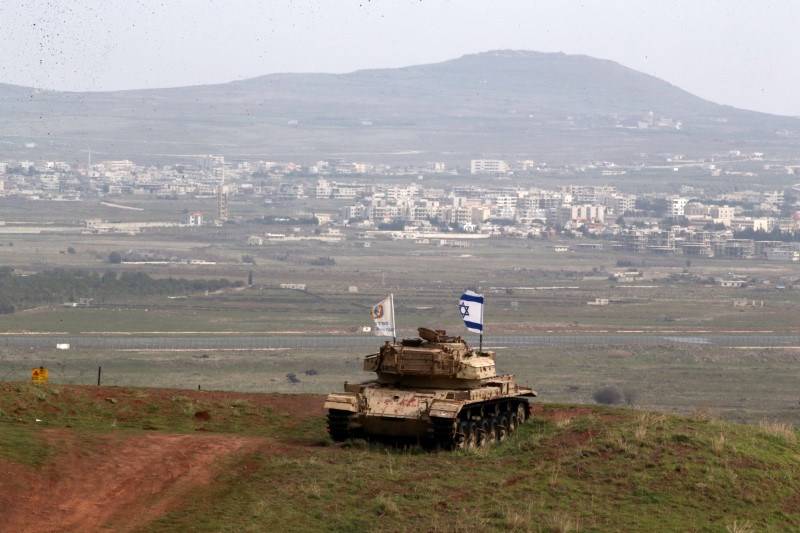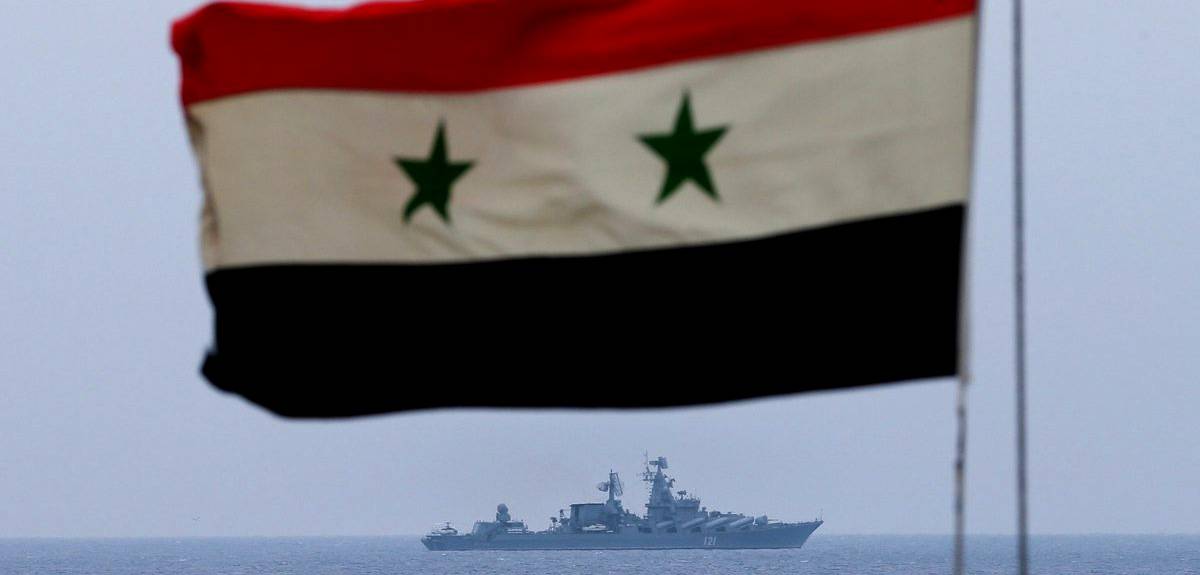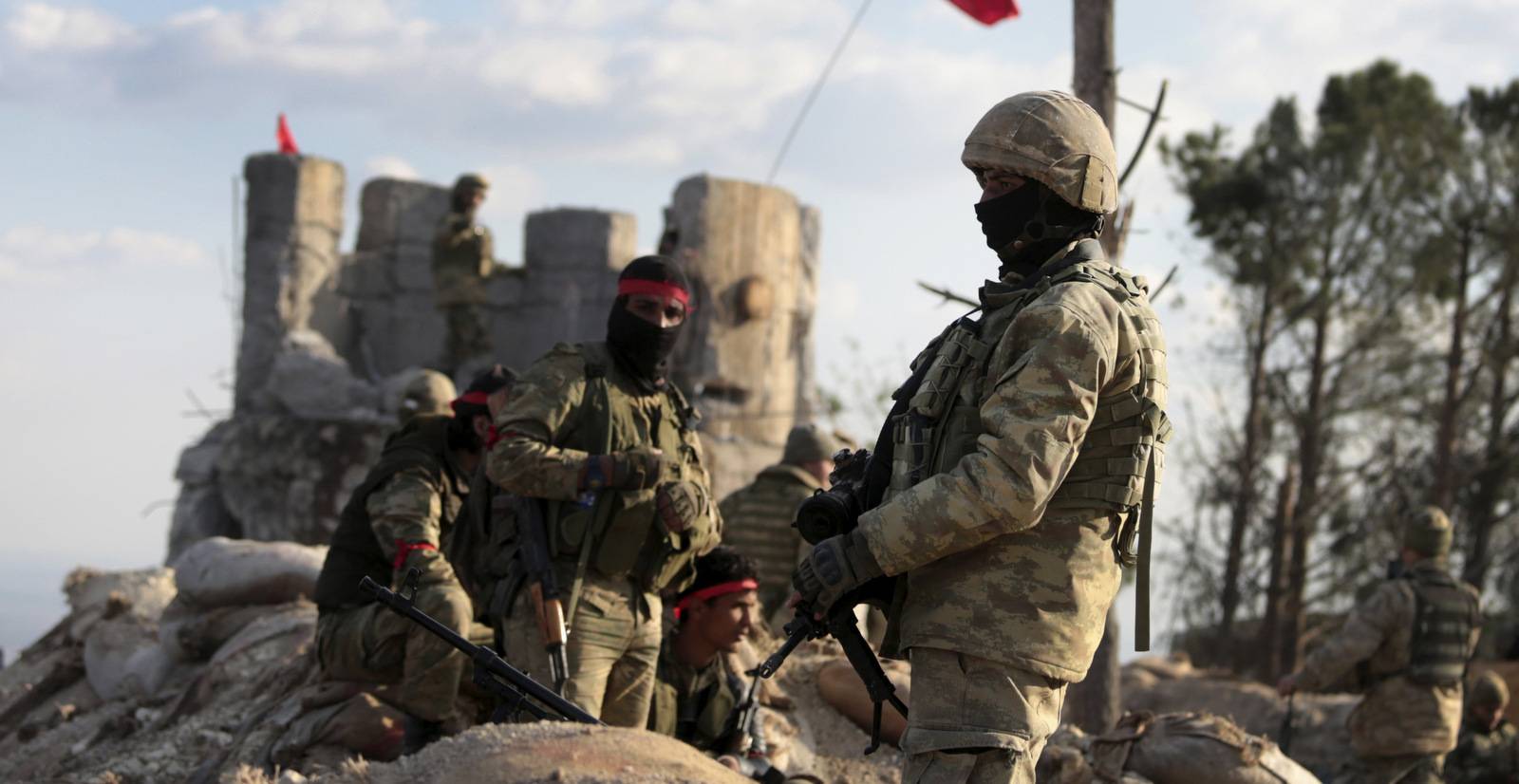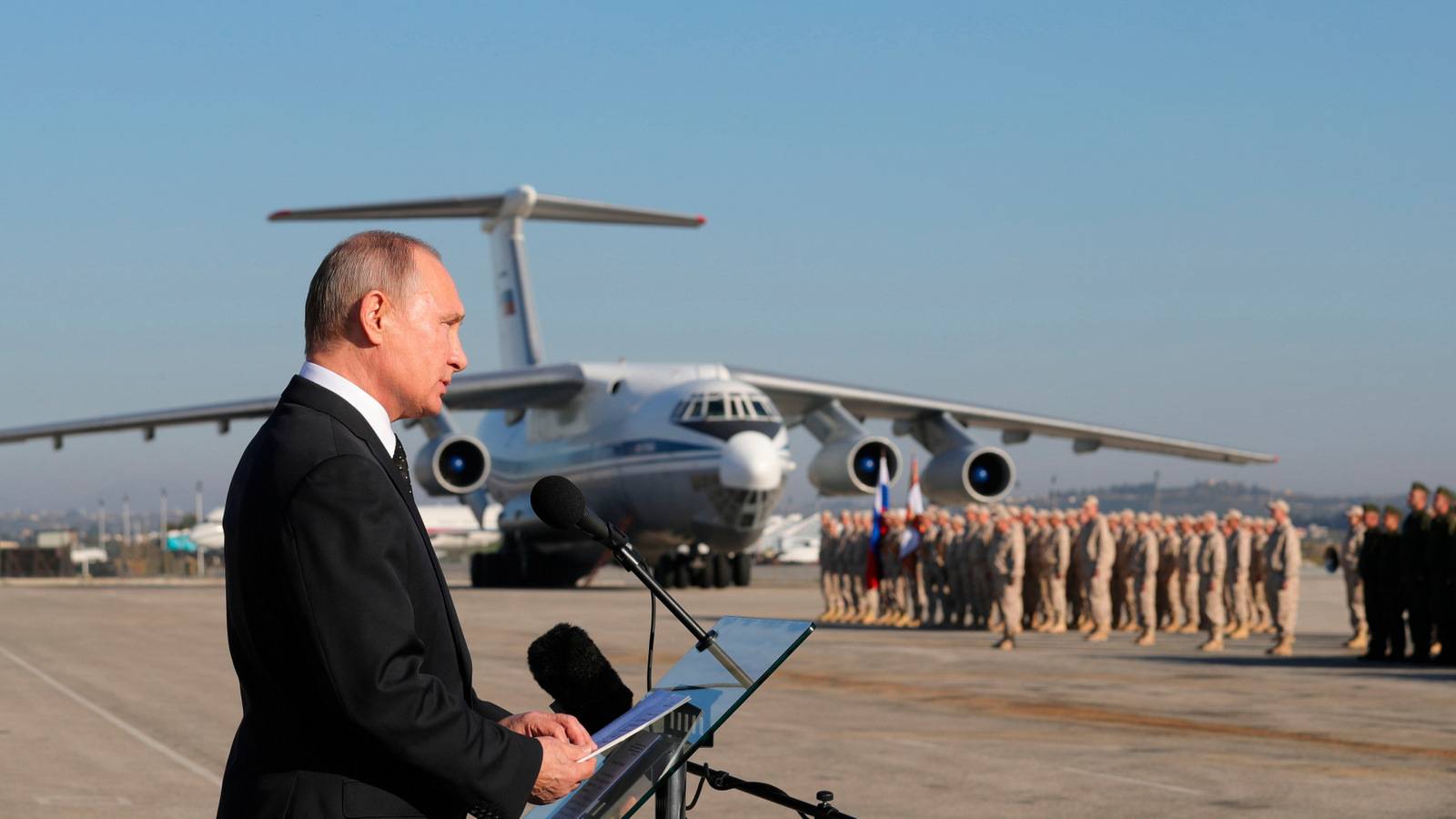Any miscalculated escalation in Syria could result in an all-sided fight that could spill beyond the Middle East alone. In Russia, state broadcasters are now warning residents to stock up on essential goods such as food, water, and even gas masks in case of a nuclear war.
The world is standing at the precipice of potential global conflict following accusations that the Syrian Army used chemical weapons on April 7 in Eastern Ghouta to cap what clearly was its inevitable victory against the last major jihadist hold-out in the country.
The alleged incident remains muddled in terms of material evidence, yet reports by Western-sponsored NGOs like the White Helmets and opposition media activists quickly prompted threats of a full-fledged military assault by the United States and its junior partners.
In response to Russia’s repeated warnings that any attack on Syria would be met with a military response given their extensive military presence in the country — including military police units near the site of the alleged attack — U.S. President Donald Trump dramatically upped the ante with a good old tweet:
https://twitter.com/realDonaldTrump/status/984022625440747520
On Thursday morning, internet users and officials across the world scratched their heads as the former reality television star backed away from his threatening rhetoric with another perplexing tweet:
https://twitter.com/realDonaldTrump/status/984374422587965440
Regardless of the president’s bipolar tendencies, tensions are continuing to reach an extreme pitch amid reports of military maneuvers throughout the region, building the potential for a disastrous turn in Syria’s seething eight-year civil war. U.S., French and British naval forces are arraying themselves just outside of Syria’s territorial waters while the Russian Navy is also preparing for a potential conflict.
Washington is surely aware of the stakes in any military gambit, given the vast fallout resulting from its military adventures in Afghanistan, Iraq, and Libya, yet this hasn’t stopped Trump from telegraphing his punches, despite tweeting in 2013 how “In war, the elememt (sic) of surprise is sooooo important.”
And while media reports on the flood of hostile rhetoric make the situation appear to be a showdown between Russia and the United States, akin to the buildup to a gunfight in old Western cinema from the 1950s, such a reading of the situation is far too simplistic.
Instead, a “Mexican standoff” resembling the climatic battles in the films of Sergio Leone and Quentin Tarantino could be brewing, involving a multitude of regional and international belligerents with interwoven and overlapping interests. Any miscalculated escalation could result in an all-sided fight that could spill beyond the Middle East alone. In Russia, state broadcasters are now warning residents to stock up on essential goods such as food, water, and even gas masks in case of a nuclear war.
Various players in the Syrian standoff have their own agenda, regardless of “humanitarian” pretexts for intervention, with interests often overlapping and occasionally clashing.
Russia, Iran and Lebanon’s Hezbollah are naturally remaining at Syria’s side, while the U.S., France and the U.K. are being joined by a Saudi Arabia eager to play the role of toady in a campaign that could roll back Iranian regional interests. Meanwhile, Israel is playing its own dangerous game in the crisis while a middling Turkey has carved out a complicated role in the north of the country.
Commenting on the mounting chaos being propelled by the United States’ threats, Russian ambassador to the United Nations Vassily Nebenzia’s commented on Monday:
“The lack of a clear strategy on any issue is appalling not just to us, it confounds not only us, but it confounds the majority of those sitting here. But [your allies] have decided not to openly put this forward to you, following you everywhere you go … Do you understand the dangerous threshold towards which you are bringing the world?
We call upon Western politicians to scale down their hawkish rhetoric, to meaningfully consider possible repercussions and to cease the reckless spill over of threats to global security … nobody has vested you with the power to act as policemen of the world and as investigators, procurators, judges and executioners all at the same time.”
Israel’s gambit

On early Monday morning following a warning by U.S. President Donald Trump that there would be a “big price to pay” for the alleged chemical attack on Douma, eight missiles struck Syria’s T-4 air base near Homs. The UK-based Syrian Observatory for Human Rights (SOHR) reported that 14 people were killed in the strike – among whom were seven Iranian military personnel, according to Iran’s Tasnim news agency, including a senior officer in Iran’s unmanned drone program.
The Russian military quickly announced that the aircraft responsible for the attack were two Israeli F-15 jets, who attacked from Lebanese airspace. Enraged Russian authorities demanded clarification for the attack, according to Lebanon’s Al Mayadeen TV station.
Speaking from Damascus, the senior aide to Iran’s top leader Ayatollah Ali Khamenei, Ali Akbar Velayati, commented that the attack was “Israel’s crime” and promised that it “will not remain unanswered”
#BREAKING: Iranian media publishes 1st images of the damage in T4 Syrian airbase after the reportedly Israeli airstrike 48 hours ago which killed 14 (@Tasnimnews_EN) pic.twitter.com/uMsVFlfl3k
— Amichai Stein (@AmichaiStein1) April 11, 2018
Senior military officials in Tel Aviv replied menacingly, with War Minister Avigdor Lieberman telling Israeli media that occupation forces would continue to prevent Iran from establishing a “foothold” in Syria “no matter what the price.”. Unnamed senior officials also warned that any response to Israeli aggression by Iran would result in,
“Assad’s regime and Assad himself … disappear[ing] from the map and the world.”
Tel Aviv also warned that any direct war between Syria, Iran and the Israelis would spill into Lebanon if allied resistance movement Hezbollah comes to the aid of Damascus, warning that Hezbollah Secretary-General Sayyed Hassan “Nasrallah needs to understand that his fate will be no different from the fate of Assad and he will pay a very heavy price.”
Showing no sign of intimidation, Velayati told reporters in Eastern Ghouta Wednesday:
“We will stand by Syria’s government against any foreign aggression … Iran backs Syria in its fight against America and the Zionist Regime.”
The panoply of war

Meanwhile, Trump has busied himself speaking to junior partners like French President Emmanuel Macron, U.K. Prime Minister Theresa May, Qatari Emir Tamim bin Hamad Al-Thani, and Saudi king-in-waiting Mohamed Bin Salman.
Germany, for its part, has precluded any involvement in the conflict. On Thursday, Chancellor Angela Merkel noted that a “whole spectrum of measures must be considered on Syria” yet her country wouldn’t take part in any military strikes on Syria.
The most eager participants in a potential attack on Syria, so far, are France, the United Kingdom, and Saudi Arabia. On Thursday morning, Macron alleged that he possessed “proof that chemical weapons — at least chlorine gas — were used by Assad’s regime,” and that France’s response would be decided at the moment that is “most effective.”
Any strikes pose the grave risk of killing Russian servicemembers based in Syria, and Russian military leaders, officials and politicians have repeatedly warned that any such attack would be met by a symmetric response. Russian news agency TASS reports that according to various Russian military websites, an unconfirmed secret order has been issued placing the country’s armed forces on full combat alert.
The Russian military has noted various movements of the U.S. Navy in the Gulf, indicating the crucial role envisioned for the navy in any strike on Syria. Interfax news agency has also reported that a NATO surveillance plane is circling Syria’s northern border in Turkish airspace.
A U.S. guided missile destroyer, the USS Donald Cook, has already deployed near Syrian territorial waters in the Mediterranean. According to CNN Turk, the Arleigh Burke-class ship carries at least 60 Tomahawk cruise missiles, allowing the ship to carry out an attack similar to last year’s strike on a Syrian air base by the USS Porter. BGM-109 Tomahawks carry half-ton warheads that are capable of hitting targets from a distance of around 1,000 miles.
The U.S. Navy has also announced “the planned deployment” – announced right after the alleged attack – of the USS Harry S. Truman Carrier Strike Group to the region. The Truman, a nuclear-powered aircraft carrier, will include an array of strike and reconnaissance aircraft and will destroyers USS Arleigh Burke, USS Bulkeley, USS Forrest Sherman and USS Farragut, as well as the guided-missile cruiser USS Normandy.
The British prime minister has reportedly ordered an array of Royal Navy submarines to deploy to the Mediterranean in case the decision is made to attack. These could either be nuclear Astute-class submarines that can carry 38 missiles, or Trafalgar-class attack submarines which can carry 30 missiles.
A source at Whitehall told London’s Telegraph:
“We are moving subs in, we are doing everything necessary operationally to do that. If any action is going to happen it is going to happen before Monday because once you start having a debate about it, it will be very difficult for No 10 to do anything.”
Turkish daily Yeni Safak, citing international relations scholar Zakariye Molahafci, claims that the Pentagon has drawn up a detailed map of 22 strategic targets in Syria that would be struck in an initial attack, including at least two bases where Russian soldiers are deployed. The U.S. Central Command has also been updating lists of potential military and government targets in Syria such as aircraft hangars, ammunition depots, and command headquarters, according to the New York Times.
While Russian officials are playing down the possibility of the U.S. sparking a major war over the “far-fetched” claims of chemical weapons usage by Syria, its Ministry of Defense is stepping up activity in the Black Sea, Mediterranean Sea and Caspian Sea in case it is forced to retaliate using its Kalibr cruise missiles.
Speaking to Nezavisimaya Gazeta, Lt. Gen. Yuri Netkachev noted:
“The Kalibr strikes may be launched on U.S. facilities and bases in the Middle East if the Pentagon, which accuses Russia of the notorious chemical attacks, decides to deal a retaliatory blow on the Russian bases in Tartus and Hmeymim.”
Russia’s mission in Syria also includes the protection of the most formidable air defense systems in the world, including the vaunted S-400 and S-300VM long-range anti-missile systems.
The strange outlier: Turkey

Amid the tangled mess of Russia’s conflict with the West and the Saudi-Israeli fight to “contain” Tehran and its allies, Turkey finds itself in an increasingly uncomfortable position. While Turkish President Recep Tayyip Erdogan misses no opportunities to express his loathing for the “Syrian regime” of President Bashar al-Assad, he remains on a delicate see-saw of increasingly warm ties with Russia and Iran and mounting tension with Turkey’s NATO allies over the Kurdish question in northern Syria as well as its allegiance to allied Qatar amid its feud with Saudi Arabia.
As the Turkish campaign in Northern Syria dubbed Operation Olive Branch continues, Al Mayadeen has reported that U.S., French and British forces are now conducting patrol missions in the strategic Kurdish-held city of Manbij to ward off a Turkish offensive against their Kurdish foes in the People’s Protection Units (YPG), who have ties to the outlawed Kurdistan Workers’ Party in Turkey, while a huge cache of Saudi arms has also reached the YPG.
Nevertheless, Turkey quickly joined the chorus of demands for Syrian accountability following the alleged chemical weapons attack, with presidential spokesman Ibrahim Kalin saying on Monday, “The Syrian regime will have to pay a price.”
Turkey has responded angrily to calls by Iran and Russia to relinquish the conquered city of Afrin to Damascus, maintaining that the occupied city will remain in the hands of the Turkish Army and its rebel allies until the threat of Kurdish “terrorism” is removed and a new government in Damascus is formed.
While Ankara maintains that it will continue its relations with the U.S., Russia, and Iran, one can only conclude that Ankara is strategically rudderless over the wider questions raised by the geopolitical tug-of-war in Syria and remains solely focused on eliminating the Kurdish presence at its southern border.
Trump’s tantrums and the warmongering adults in the room

The dust-storm of tweets and bluster emanating from the White House can hardly conceal the obvious fact that the U.S. commander-in-chief is a flip-flopping amateur whose ideology seems to wildly shift with the winds of domestic scandal. Two weeks ago, Trump was promising that the U.S. would end its military presence in Syria “very soon,” causing an uproar in his cabinet.
Despite the feckless nature of the former casino mogul, his administration isn’t lacking in figures with strong ideological mooring such as newly-appointed national security advisor John Bolton and Secretary of State Mike Pompeo.
While Trump lamented the arms race with Russia just this week, Bolton himself has called for its acceleration through the abrogation of arms control treaties while also advocating measures meant to make the Kremlin “feel pain.” More importantly, Bolton and Pompeo have displayed an obsessive hatred for Iran, with the former claiming that Syria is a mere sideshow on the road to “getting rid of the ayatollahs in Tehran.”
Likewise, pro-Israeli figures like Senator Lindsey Graham are goading Trump into plowing forward into a war on Syria, noting that “If he doesn’t follow through and live up to that tweet, he’s going to look weak in the eyes of Russia and Iran.”
Defense Secretary James “Mad Dog” Mattis has been more circumspect on the matter. While he has called the alleged use of chemical arms “inexcusable,” he remains insistent on the need to end the fight against ISIS. On Thursday, he told a House Armed Services Committee hearing that what most concerns him is:
“On a strategic level, it’s how do we keep this from escalating out of control, if you get my drift on that.”
Chaos is the constant

The U.S. military, being a colossus with feet of clay, can always do plenty of damage on a unilateral level, yet it can ill afford a major conflict resulting in serious casualties or financial costs, let alone one that pits its military against the formidable weaponry of the Russian Armed Forces.
This reality often seems lost on Donald Trump. Seemingly on a whim, the lifelong showman and real estate heir jumps from one position to another while issuing cavalier threats of catastrophic war.
Speaking to The Washington Post, one aide at the White House depicted the working environment at the top echelon of the executive wing in ridiculous terms:
“It’s just like everybody wakes up every morning and does whatever is right in front of them … Oh, my God, Trump Tower is on fire. Oh, my God, they raided Michael Cohen’s office. Oh, my God, we’re going to bomb Syria. Whatever is there is what people respond to, and there is no proactive strategic thinking.”
Yet while Washington lacks proactive strategic thinking and its agenda shifts from day to day, the same can’t be said about every party to the Syrian conflict — however opportunistic their motives may seem.
Saudi Arabia and Israel are focused on their fight against Iran. Turkey is obsessed with defusing Kurdish demands for regional autonomy while still gunning for the fall of Bashar al-Assad alongside its weakened partner, Qatar. France seems dedicated to staking an alliance with the Gulf Arab states headed by the Saudi kingdom, while Britain remains keen on defending its own historic interests in the region. Meanwhile, Russia and Iran are hardly the keenest friends but they are resolved not to let their mutual antagonists rip Damascus to shreds and unleash the floodgates of separatists, Salafi jihadists and other extremists throughout the region.
Amid the chaos and danger swirling throughout the Middle East, could the spark for world war be set off by one of Donald Trump’s wild mood swings and provocations?
If so, enough firepower and animosity has been gathered in Syria to create a worldwide conflagration that no one will be able to control.
Via MintPress News






